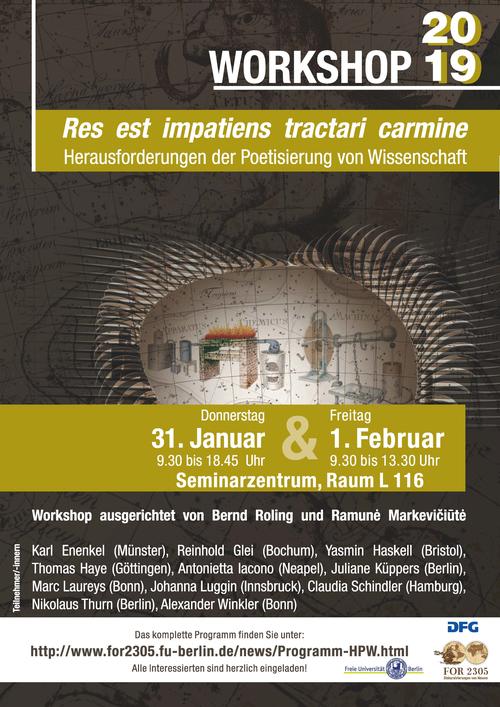"Res est impatiens tractari carmine". The Challenges of Poeticizing Science (Workshop Hosted by Ramunė Markevičiūtė and Bernd Roling)
Date: 31 January - 1 February 2019
Place: Freie Universität Berlin, Habelschwerdter Allee 45, 14195 Berlin
Room: Seminarzentrum, L 116
Organisers: Ramunė Markevičiūtė (ramunemar[at]zedat.fu-berlin.de) / Bernd Roling (bernd.roling[at]fu-berlin.de) (DFG Research Group "Discursivizations of the New. Tradition and Innovation in Medieval and Early Modern Texts", Subproject 06: Philosophia cantat. Negotiating Epistemic Ruptures in Early Modern Philosophical and Scientific Didactic Poetry)
Within the DFG research group “Discursivization of the New,” our sub-project addresses Latin didactic poetry and the rich tradition of this genre, considering the forms it took in the era of scientific paradigm shifts of the early modern period. The research group is investigating the complex inter-relationships between the categories “new” and “old.” These categories are never defined unambiguously and their meanings must always be renegotiated, but they become especially charged in the turbulent series of revolutions in the early modern period, the era addressed by this sub-project. The didactic poem as a genre had, from its very beginning, always had to deal with technically and philosophically complex subject-matter. But how did it react to the shift from a geocentric to a heliocentric model of the world, from Aristotelian cosmology to gravitational theory and the vacuum, or to the breakthrough in the theory of electricity? And what options were created by the rupture that thus opened up between the linguistic repertoire inherited from classical antiquity and the contemporary theories?
The workshop on the “Challenges of poeticizing science” wishes to extend the invitation to discuss the possibilities and limitations of poetic treatment of (natural) science and philosophical subjects in late medieval and early modern didactic poetry. Is the poet’s paradigmatic complaint about the difficulty of the subject-matter a mere commonplace, or does it express a genuine dilemma in which poetic facility and scientific precision have to be weighed up against each other? Is the classical repertoire of metaphors and images always able to yield an apt solution for the description of new theories and techniques, or are new poetic inventions deployed? Is that which is really “new” here limited to the content? We hope through this workshop to illuminate not only the challenges of poetic praxis in relation to scientific poetry, but also aspects of its contemporary aesthetic reception, and so to make a contribution to the wider question of the literariness of scientific language.
Programme
Thursday, 31 January 2019
| 9:30 | Begrüßung / Welcome address |
| 9:45 | Ramunė Markevičiūtė (Berlin): Einleitung / introduction |
|
DAS LEHRGEDICHT IM ITALIENISCHEN RINASCIMENTO |
|
| 10:30 | Karl Enenkel (Münster): Ludovico Lazzarellis De gentilium deorum imaginibus |
| 11:15 | Kaffeepause / Coffee break |
| 11:45 | Antonietta Iacono (Neapel): Mythopoiesis und Wissenschaft in Pontanos De hortis Hesperidum |
| DIE POETISIERUNG DES WISSENSCHAFTLICHEN OBJEKTS POETICIZING THE SCIENTIFIC OBJECT |
|
| 12:30 | Nikolaus Thurn (Berlin): Giovanni Augurellis Chrysopoeia: Zwischen Alchemie und chemischen Farben |
| 13:15 | Mittagessen / Lunch |
| 15:15 | Claudia Schindler (Hamburg): Miranda inventa magistri. Ekphrasen technischer Geräte in neulateinischer Jesuiten-Lehrdichtung |
| 16:00 | Bernd Roling (Berlin): Thy gift, Pomona! John Philips ‚Cider‘ zwischen vergilianischem Nationalgedicht und agrarökonomischer Fachliteratur |
| 16:45 | Kaffeepause / Coffee break |
| POLITIK UND ETHIK POLITICS AND ETHICS |
|
| 17:15 | Yasmin Haskell (Bristol): Scientific Poetry in the Shadow of the Jesuit Suppression |
| 18:00 | Marc Laureys (Bonn): Literarische Kunst und Friedensengagement in der Bombarda des Bartholomaeus Latomus |
Friday, 1 February 2019
| 9:30 | Alexander Winkler (Bonn): Raphael Thorius' Hymnus Tabaci (1625): Tabacology and the Global Ethics of Tobacco Consumption |
| IM ZEITALTER NEWTONS IN THE ERA OF NEWTON |
|
| 10:15 | Ramunė Markevičiūtė (Berlin): Mobilisierung der Dinge. Krieg und Louis XIV im frühneuzeitlichen Lehrgedicht Frankreichs |
| 11:00 | Kaffeepause / Coffee break |
| 11:30 | Juliane Küppers (Berlin): Introducing Isaac Newton: Lucretian Hero or Staunch Providentialist? The three versions of Edmond Halley's Ode to the Principia |
| 12:15 | Abschlussrunde / Conclusion |
